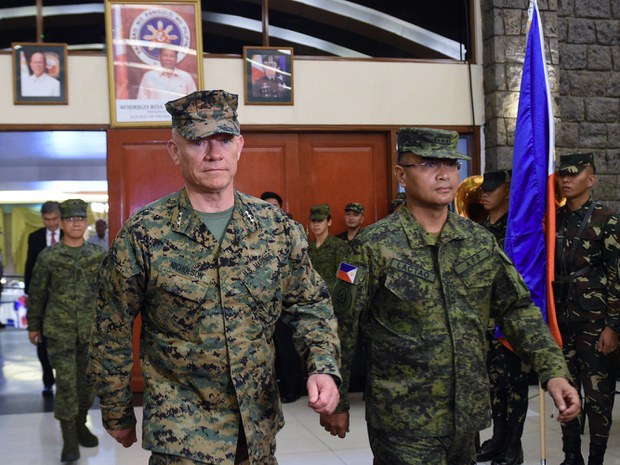Philippines, US Launch First Joint Military Drills Under Duterte
2017.05.08
Manila
 Lt. Gen. Lawrence Nicholson (left) walks with his Philippine counterpart, Lt. Gen. Oscar Lactao, during the opening ceremony of the annual Philippines-U.S. military exercises at Camp Aguinaldo in Manila’s Quezon City suburb, May 8, 2017.
Lt. Gen. Lawrence Nicholson (left) walks with his Philippine counterpart, Lt. Gen. Oscar Lactao, during the opening ceremony of the annual Philippines-U.S. military exercises at Camp Aguinaldo in Manila’s Quezon City suburb, May 8, 2017.
The Philippines and United States on Monday kicked off their first joint military drills since President Rodrigo Duterte took office 10 months ago and shifted his country’s geopolitical defense strategies to focus more on bilateral cooperation with China.
Some 5,400 Filipino and American soldiers are taking part in the nine-day “Balikatan” exercises – named after the Filipino word for “shoulder-to-shoulder” that will focus on counterterrorism drills, disaster relief and humanitarian operations, military officials said.
A hundred other soldiers from regional allies Australia and Japan were also attending the drills in several provinces of the Philippines as observers, a joint statement said.
Community engagement activities were to be carried out by the allies in the central Philippine provinces of Panay, Leyte ad Samar while humanitarian and counterterrorism exercises were to be launched on the main island of Luzon.
“The Armed Forces of the Philippines and U.S. military have a longstanding relationship that has contributed to regional security and stability and is deeply rooted in cooperation,” the statement said.
The military exercises are the first since Duterte was sworn in as president in late June 2016, and came after he had antagonized the United States and threatened to end a military deal that allowed for joint exercises.
Scaled-down drills
This year’s exercises, aimed at developing tactics, techniques and procedures, will involve about half the number of Filipino and American soldiers who participated in the 2015 edition of Balikatan.
In December, the 72-year-old Duterte warned Washington that he would do away with the Visiting Forces Agreement after the U.S. aid agency Millennium Challenge Corp. decided to cut funding for programs to eradicate poverty in the Philippines.
Signed by both countries in 1998, the agreement provided legal status to thousands of American troops who rotate for joint exercises with Filipino soldiers.
Duterte’s threat came months after he warned that the latest round of “Balikatan” would be the last. But when Donald Trump won the U.S. presidential election in November, the Filipino leader appeared to have softened his tone.
He has spoken twice to Trump and, last week, he said the American leader had asked him to speak with Chinese counterpart Xi Jinping to discuss the nuclear threat on the Korean Peninsula.
Duterte also called Trump a “pragmatic, realist leader” unlike his predecessor, Barack Obama, whom he has criticized for snubbing him at a regional forum and for calling him out on his deadly anti-drugs policy that has left thousands dead.
U.S. Ambassador Sung Kim, in opening remarks on Monday, said the exercises reinforced the two nations’ defense cooperation as they faced “daunting challenges posed by international terror networks,” among others.
“We also understand that bilateral disaster response training can help save lives and help rebuild devastated communities,” Kim said. “No nation can face today’s challenges alone, whether a natural disaster (that) ravages part of the world or man-made crisis that shocks a community.”
He said the Filipino and U.S. forces could deliver a stronger response if they worked together. And that the lessons in the exercises “will allow us to respond together to the next disaster more quickly and more effectively.”
Part of the military drills this year would involve simulating a response to a major storm striking the eastern Philippines, which endures about 20 storms each year.
Kim said the counterterrorism training would also help develop “critical skills” and trust between the two forces.
The joint drills “will reinforce the deep and lasting commitment among our armed forces to each other,” Kim said.







